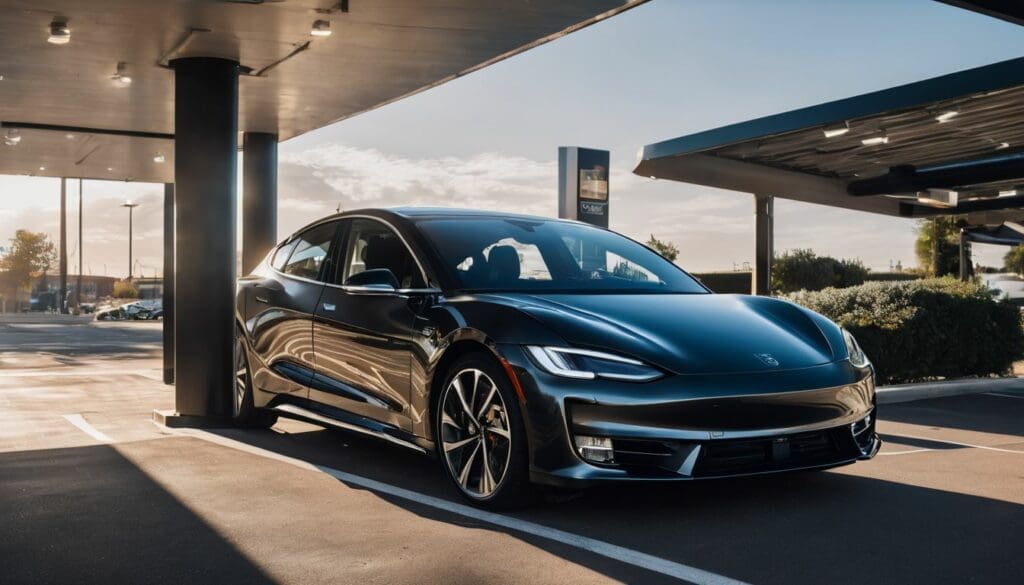As our planet grapples with the pressing issue of climate change, many of us are seeking ways to reduce our environmental impact. Interestingly, solar power has surged forward as a leading renewable energy source, capable of shaving off significant carbon emissions.
This article will explore how harnessing solar energy can revolutionise the way we fuel electric vehicles (EVs), making clean driving more accessible and efficient for everyone. Dive in to discover a brighter future on the road!
Key Takeaways
- Solar panels on homes can charge electric vehicles directly, cutting down carbon emissions and reducing dependency on non-renewable energy sources.
- Federal tax credits and state incentives are available to make solar panels and electric vehicle purchases more affordable, encouraging adoption of clean energy.
- The growing network of solar – powered EV charging stations is increasing accessibility for electric vehicle users, supporting sustainable transport systems.
- By using homegrown solar power for EVs, individuals gain energy independence while contributing to a decrease in greenhouse gas emissions.
- The integration of solar power with the grid for charging electric vehicles represents a key step towards a greener future in transportation technology.
The Benefits of Going Solar
Reduce your carbon footprint with solar power, save money on utility bills and achieve energy independence.
Reduced carbon footprint
Harnessing solar power for your electric vehicle significantly slashes carbon emissions. Traditional cars running on petrol or diesel burn fossil fuels, releasing large amounts of CO2 into the atmosphere, contributing to climate change.
Solar panels converting sunlight directly into electricity don’t emit any greenhouse gases during operation. Charging your EV with this clean energy means you’re driving without leaving a trail of harmful pollutants behind.
Switching to a solar-powered charging system at home combines renewable energy with sustainable transportation, creating an eco-friendly loop from sun to car. Electric vehicles themselves are already more efficient and produce fewer emissions than their combustion-engine counterparts, even when charged from the grid.
But when paired with solar panels on your roof, they close the cycle of dependence on non-renewable resources and propel us towards a greener future in mobility.
Cost savings
Switching to solar power for your home and electric vehicle can lead to substantial cost savings in the long run. By generating your own electricity with solar panels, you can significantly reduce or even eliminate your monthly energy bills, freeing up more money for other expenses or investments.
Additionally, when you charge your electric vehicle using solar energy instead of purchasing traditional fuel, you’ll save on transportation costs and contribute to a cleaner environment.
Making the switch to solar power not only benefits the planet but also lowers your overall expenditure, making it a financially savvy choice.
Energy independence
Electric vehicles can be charged using homegrown solar energy, offering a sustainable and independent power source. By utilising solar panels to charge EVs, individuals can reduce their reliance on the grid and lower their carbon footprint.
This integration of clean energy technologies promotes self-sufficiency and contributes to a more environmentally friendly transportation system.
Furthermore, homeowners who invest in solar power for charging their electric vehicles contribute to the overall reduction of greenhouse gas emissions. The ability to generate electricity from sunlight not only reduces costs but also ensures that driving an electric vehicle aligns with sustainable and eco-friendly principles.
The Relationship Between Solar Power and Electric Vehicles
Utilising homegrown solar energy to power electric vehicles is a sustainable and cost-effective way to reduce carbon emissions. The potential for grid integration and the increase in EV charging stations due to solar technology further highlights the strong relationship between solar power and electric vehicles.
Using homegrown solar energy to power EVs
One way to power electric vehicles sustainably is by harnessing solar energy at home. By installing solar panels, environmentally conscious individuals can generate their own clean electricity to charge their EVs.
This method reduces reliance on the grid and decreases carbon emissions associated with traditional energy sources. Additionally, using homegrown solar energy promotes energy independence while contributing to a cleaner environment.
Utilising homegrown solar power for EV charging aligns with the principles of sustainable technology and clean transportation. It offers an alternative fuel option that is not only environmentally friendly but also cost-effective in the long run.
The potential for grid integration
Solar power has the potential to be integrated into the grid for electric vehicle (EV) charging. This means that solar energy can be harnessed and fed into the power grid, providing clean and renewable electricity for not only homes but also EVs.
By connecting solar panels to the grid, surplus energy can be used to charge EVs during peak sunlight hours, reducing reliance on non-renewable sources of energy and promoting sustainable transportation options.
Integrating solar power with the grid creates a more robust and resilient energy infrastructure, meeting the increasing demand for electric vehicles without putting additional strain on traditional power sources.
Increase in EV charging stations due to solar
Solar-powered electric vehicle (EV) charging stations are on the rise, and they play a crucial role in promoting sustainable transportation. The growing adoption of solar panels for generating clean energy has led to an increase in EV charging infrastructure across various locations.
It not only boosts the accessibility of EV charging points but also contributes to reducing carbon emissions by utilising renewable energy sources.
This shift towards solar-powered EV charging stations marks a significant step forward in creating a more environmentally friendly transportation network. As more individuals embrace solar technology, the integration of these systems into EV infrastructure is expected to further expand, fostering a greener and more sustainable future.
Incentives for Owning an EV and Going Solar
Explore the various federal tax credits and state incentives available for those who own an electric vehicle and choose to go solar. Read on to discover how you can benefit from these incentives while contributing to a greener future.
Federal tax credits
Federal tax credits can significantly reduce the cost of both solar panel installation and electric vehicle purchase. These incentives provide financial benefits for environmentally conscious individuals looking to reduce their carbon footprint and support renewable energy usage. Here are the key points related to federal tax credits:
- The Federal Solar Investment Tax Credit (ITC) provides a 26% credit for residential solar systems installed before the end of 2022, decreasing to 22% in 2023.
- Electric vehicle buyers may be eligible for a federal tax credit of up to $7,500 based on the capacity of the battery used to fuel the vehicle.
- In some cases, state and local governments offer additional incentives to complement federal tax credits.
State incentives
- Rebates for the installation of solar panels and EV charging stations
- Tax credits for the purchase of electric vehicles or the installation of solar energy systems
- Grants for community solar projects and infrastructure development
- Net metering programmes that allow solar – powered homes to sell excess energy back to the grid
- Zero – emission vehicle (ZEV) incentives such as access to carpool lanes and reduced registration fees
Tapping into Solar Battery Power for EV Charging
Utilising solar battery power for EV charging allows for easy home-based charging and reduces reliance on the grid, further enhancing the sustainability of electric vehicles. Learn more about how solar power and electric vehicles are revolutionising the way we think about transportation and energy consumption.
Ease of home-based EV charging
Home-based EV charging is incredibly convenient with solar power. Electric vehicles can be charged at home using energy generated from rooftop solar panels. This provides flexibility and reduces reliance on public charging stations, giving owners greater control over their vehicle’s charging schedule.
By harnessing the sun’s energy, environmentally conscious individuals can charge their electric cars sustainably and efficiently at home, contributing to a greener future for transportation.
Solar-powered EV charging simplifies the process of keeping electric vehicles charged, all without adding strain to the existing grid infrastructure. Homegrown solar energy makes it easier for people to embrace alternative fuel vehicles while reducing their carbon footprint.
Reducing reliance on the grid
Solar power offers a promising solution to reduce reliance on the traditional energy grid. By harnessing solar energy for powering electric vehicles (EVs), individuals can decrease their dependence on non-renewable resources and carbon emissions.
Integrating solar panels into EV charging stations enables users to generate their electricity, reducing the strain on the conventional grid system.
Furthermore, storing excess solar energy in batteries for later use in charging EVs can further reduce reliance on the grid during peak demand periods. As technology continues to advance, more efficient and affordable solar battery options will make it easier for environmentally conscious individuals to embrace sustainable energy solutions and contribute to a cleaner environment.
Future Outlook: The Solar-Powered EV Charging Revolution
The future outlook for solar-powered EV charging is promising. Advancements in technology and infrastructure are paving the way for a widespread revolution in how electric vehicles are powered.
With an increasing focus on sustainability, more businesses and communities are investing in solar-powered charging stations, reducing reliance on grid-based electricity for powering EVs.
This trend not only promotes the use of renewable energy but also contributes to a significant reduction in carbon emissions. As the momentum builds, the integration of solar power with electric vehicle charging is set to play a pivotal role in driving sustainable transportation forward.
As environmental awareness continues to grow, individuals and industries alike are recognising the importance of embracing clean energy solutions that benefit both consumers and the planet.
Conclusion
In conclusion, solar power and electric vehicles create a symbiotic relationship. Homegrown solar energy can be used to power EVs, reducing reliance on traditional energy sources. With the potential for grid integration and an increase in EV charging stations fueled by solar, the future holds promise for a solar-powered EV revolution.
This partnership between renewable energy and sustainable transportation offers both environmental benefits and long-term cost savings.
FAQs
1. How does solar power connect with electric vehicles?
Solar energy and electric cars team up to form a green energy solution that can reduce carbon emissions, with solar panels car charging making it simple for drivers to power their vehicles using homegrown, renewable energy.
2. Can you charge an electric vehicle with solar panels?
Absolutely! You can use photovoltaic cells in solar panel car charging stations at home or at public spots to charge hybrid cars and other electric vehicles using the sun’s rays.
3. Are there benefits to using solar-powered electric vehicles?
The main perks of going for solarpowered electric vehicles include slashing your carbon footprint and enjoying energy efficiency gains by switching from gridtied systems to renewable sources like the sun.
4. What is a solar carport charging station?
A solar carport charging station is a setup where you park and juice up your EV under an awning lined with photoelectric cells – this turns sunshine into electricity while keeping your vehicle cool!
5. Is integrating solar technology with electric vehicles good for the environment?
Yes indeed! Integrating top-notch solar tech into our rides helps us cut down on harmful exhaust fumes, steer clear of fossil fuels, and pave the way towards cleaner air and a healthier planet.





